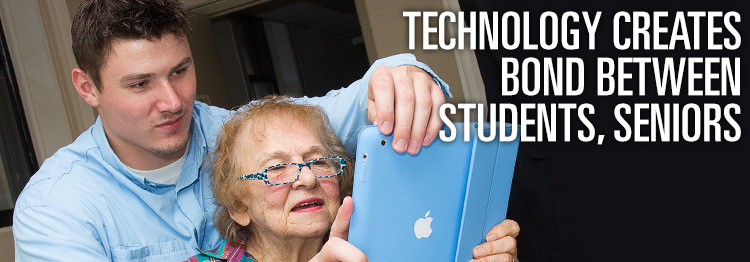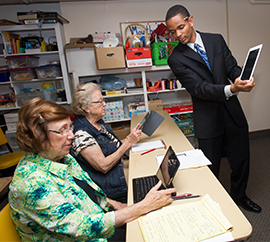Technology creates bond between students, seniors
Technology creates bond between students, seniors

By Jen Sobolewski
It's a scene that can't help but bring a smile to your face. Three young men, in dress shirts, are hunched over iPads with a group of senior citizens, all women. They're helping them learn the ins and outs of tablet technology.
The technology is frustrating, and the women are full of questions, but this group of Bowling Green State University students patiently answers and walks them through the solutions to various problems.
The technology classes at the Wood County Senior Center are the brainchild of Dr. Kate Magsamen-Conrad, an assistant professor of communication. Magsamen-Conrad says she got the idea last summer while staying with family.
"I taught my grandmother how to use a laptop and it was a disaster," she said. "It required so much more than I was able to give. My original idea was a communication-across-the-lifespan course, having students work one-on-one with older adults on technology skills. But there was a need for someone to teach a small-group communication course. I thought I'd just have them work on this technology skills project instead of writing a paper."
 Magsamen-Conrad went to BGSU's Community Partnership Fair last fall and pitched the idea to area assisted-living facilities and other places that had an older clientele. The Office of Service-Learning connected her to Dr. Nancy Orel, a professor and director of the gerontology program, who pointed Magsamen-Conrad to the Wood County Committee on Aging.
Magsamen-Conrad went to BGSU's Community Partnership Fair last fall and pitched the idea to area assisted-living facilities and other places that had an older clientele. The Office of Service-Learning connected her to Dr. Nancy Orel, a professor and director of the gerontology program, who pointed Magsamen-Conrad to the Wood County Committee on Aging.
"It's been a collection of great partnerships at BGSU, folks that are really going above and beyond to support this effort, which is fantastic for me," she said.
Magsamen-Conrad introduced the technology classes to her students for the first time in the spring of 2013. Small groups developed lesson plans and spent four weeks teaching several classes at the senior center.
"Four weeks last semester wasn't enough time, the students said. This semester it was five weeks. PowerPoint presentations created by this class will be used next semester for six weeks at the senior center," explained Magsamen-Conrad. "As the deliverable workload for students decreases, I increase other parts of the program."
Classes this fall ranged from one that focused on iPads to a "try it before you buy it" class that allowed the seniors to get their hands on an array of tablets. This semester's students also use a workbook developed by the spring semester class.
During one class, the students showed the seniors how to download apps, surf the Web and take photos and video on an iPad. They also posed for test photos, talked about the new Apple operating system and did a lot of troubleshooting.
"You have to be very patient, also you have to pay attention to your lesson plan and time management, making sure you have time at the end for questions and answers," said Jacob Olson, a junior majoring in communication. "The first class, we didn't know what to expect and then once it started going it just flew. Before you knew it we were going five minutes over our allotted time period."
Daniel McHenry, a senior who took the class in the spring and is now an undergraduate mentor, said there's a fine line between trying to teach and being tech support.
"You have to kind of facilitate the lessons and at the same time explain everything," he said. "I learned if you have a thirst for knowledge it doesn't matter how old you are. Seniors get excited about the technology and as long as they're willing to learn and we're willing to teach, it's fun."
Magsamen-Conrad said these classes go beyond teaching seniors to use tablets by also helping them navigate the technology that seems to be taking over even the most mundane items.
"I learned if you have a thirst for knowledge it doesn't matter how old you are. Seniors get excited about the technology and as long as they're willing to learn and we're willing to teach, it's fun." "There is so much technology and basic technology literacy that leaves some groups of people behind," she said. "Our seniors have talked about seeing parking meters that look Space Age and sitting at dinner and getting an iPad and not a menu. We are trying to reach out to this demographic, to help build a foundational knowledge that will translate into other environments and enable them to interact with our society today."
Betty Laukhuf, 80, bought her iPad over the summer at the suggestion of her daughter.
"I wanted to learn. We're out of it if we don't. We have to stick with it," she explained. "I like to write and do word processing-it just does it all, except it can be frustrating, but I can try to let go of that and recognize that no one has it all mastered."
Laukhuf, a BGSU alumna, also said she loves working with the students. It's a feeling that is definitely mutual. Magsamen-Conrad said as the classes come to a close, students often say they're sad their time together is ending. It's a relationship that evolves from teacher-student to one where McHenry said the seniors feel more like the students' grandparents.
Magsamen-Conrad said these classes are definitely teaching her students to become better at interacting not only among themselves in a group, but also with an audience far more like the one they will encounter in their work careers.
"Most of the students say in their feedback that they have a whole new appreciation for their professors and teachers on how to teach things, how to learn about communicating to different audiences and creating shared meaning between themselves and different groups of people," Magsamen-Conrad said. "It's not as easy as when you're talking to someone who is the same as you.
"I enjoy teaching this class. It's an opportunity to create a strong relationship with my students at the senior center when we are together for hours each week. It's exhausting, but it does help them become better at parallel thinking."
"Dr. K (Magsamen-Conrad) has done something I haven't had in any other class - community outreach - and something you can put on your resume at the end of the day," said McHenry. "I think if more classes did some kind of field work with what they are teaching, students would pay more attention and take a vested interest."
Updated: 01/23/2018 09:03AM
